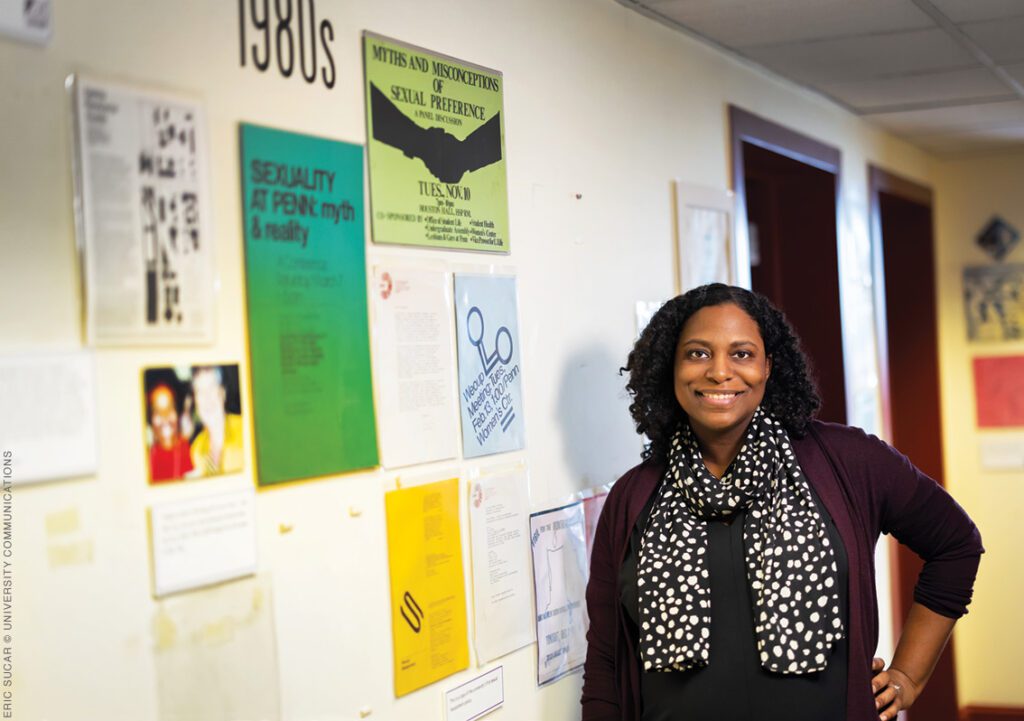“A Place I Could Be Myself”
The Penn Women’s Center celebrates five decades of providing advocacy, advising, refuge, counseling, company, and tea. From its origins in the struggle against campus sexual violence, the center has evolved to tackle a range of concerns, from wellness to combating racism. The latest debate: Is its name, meant to be welcoming, too restrictive or exclusionary at a time when gender itself is contested?
On a mild late-summer afternoon, soon after the semester’s start, a purple-and-white banner announcing an open house is attracting both the avid and the merely curious.
“I’m a woman. I like to be in spaces where other women support each other, and that’s obvious when you see the words ‘Women’s Center,’” says Leigh Monistere GrEd’28, a first-year student at the Graduate School of Education. The founder of a literacy nonprofit, she is among a stream of students investigating the Penn Women’s Center, housed in the former Theta Xi fraternity house at the corner of Locust Walk and 37th Street.
On the porch, visitors snag free T-shirts celebrating the center’s 50th anniversary and proclaiming, “Growth. Action. Solidarity.” Inside, they crowd around a table to iron decorative decals onto pouches with the center’s logo.
There’s free food, too: chocolate-covered pretzels in the living room, cheese and fruit in the eco-kitchen, with its energy-efficient appliances, cork floors, and cabinets of reclaimed wood. In the backyard garden students chat with Women’s Center staff over lavender lemonade and iced English breakfast tea. On the patio are chiseled quotes by women writers and other icons of feminism and civil rights. From Alice Walker, author of The Color Purple, comes this gentle observation: “In search of my mother’s garden, I found my own.”
Since 1973, the year of its founding, the Penn Women’s Center—which relocated in 1996from Houston Hall—has been a refuge, gathering place, and resource center for the Penn community, including faculty and staff: women mostly, but also sexual minorities and the gender nonconforming, and sometimes their straight male allies.
“The Penn Women’s Center was also a home for young gay or LGBT students,” says Daren Wade C’88 SW’94, now associate director of career development at the University of Washington’s School of Public Health. “It was very much a place that I felt like I could be myself.”
Mika Rao C’96, who was president of the South Asia Society at Penn, says she relied on the Women’s Center to help a friend with financial problems stay in school. When members of the South Asia Society faced an incident of racial intimidation, “the first thought I had was, ‘Let’s call the Penn Women’s Center,’” says Rao, now managing director of williamsworks, a philanthropy consulting firm. “What I found was that the Women’s Center was just there to support women, period, and [help them] navigate a very large, complex university system.”
Born out of concerns about sexual violence, the center also has provided a locale for a meeting or hangout, a cup of tea, career advice, quiet study, or confidential counseling. Programming over the years has tackled the nuts-and-bolts feminist issues of sexual harassment, pay equity, and reproductive rights, but also wellness and carpentry skills. The center has been at the nexus of University-wide struggles to better the status of both women and minorities, helping to spawn a range of affinity and activist groups. It was intersectional and anti-racist long before the terms became buzzwords.

But much of its agenda wasn’t explicitly political. In recent years, new mothers—including the center’s current director, Elisa C. Foster—could avail themselves of a lactation center. A small crafts room provides yarn, fabric, and a sewing machine. Along with feminist classics, the library offers poetry by Anne Sexton, Jeffrey Eugenides’ novel Middlesex, and the stories of Gertrude Stein. A 2017 volume titled Crafting the Resistance: 35 Projects for Craftivists, Protestors, and Women Who Persist has helped inspire center programming, Foster says.
The Women’s Center’s conference room is temporarily overflowing with stacks of newspaper articles and other documents. In honor of the anniversary, Foster is assembling an archival display that will debut during Homecoming Weekend. Spring semester events will include a joint symposium with the Gender, Sexuality, and Women’s Studies Program [see sidebar] and a May 18 celebration during Alumni Weekend.
The yearlong anniversary also will be an occasion for the Women’s Center to reevaluate its mission—and its name. “Nationally, at universities across the country, their Women’s Centers are changing their names to Gender Equity Centers,” says Foster. “We hear it from the students, we hear from the community that we serve, we hear it from the national trends.” A name change isn’t happening this year, but “it’s not off the table,” Foster says.
